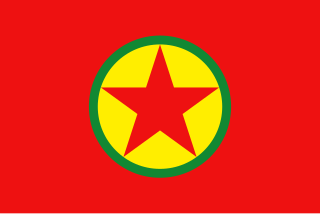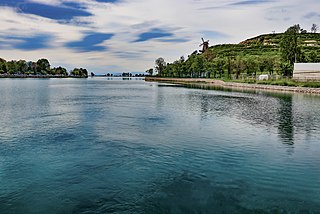
The Kurdistan Workers' Party or PKK is a Kurdish militant political organization and armed guerrilla movement which historically operated throughout Kurdistan but is now primarily based in the mountainous Kurdish-majority regions of southeastern Turkey and northern Iraq. Since 1984, the PKK has been involved in asymmetric warfare in the Kurdish–Turkish conflict. Although the PKK initially sought an independent Kurdish state, in the 1990s its goals changed to seeking autonomy and increased political and cultural rights for Kurds within Turkey.

Kurdistan, or Greater Kurdistan, is a roughly defined geo-cultural region in West Asia wherein the Kurds form a prominent majority population and the Kurdish culture, languages, and national identity have historically been based. Geographically, Kurdistan roughly encompasses the northwestern Zagros and the eastern Taurus mountain ranges.

The Kurdistan Islamic Movement is a Kurdish Islamist party founded in 1987 by mufti Osman Abdulaziz and several other Kurdish Islamic scholars who were all part of the non-political "Union of Religious Scholars" group. The party's main support comes from in and around the town of Halabja.

Malatya Province is a province and metropolitan municipality of Turkey. Its area is 12,259 km2, and its population is 812,580 (2022). It is part of a larger mountainous area. The capital of the province is the city of Malatya, which has a population of 426,381 (2010).

The Communist Party of Kurdistan – Iraq is a Kurdish political party, formed in 1993 when the Iraqi Communist Party branch in the Kurdish areas was formed into a separate party. The party is led by Kawa Mahmud.
Islamic Party of Kurdistan is a Kurdish (Sunni) Islamist organisation established in 1979 and led-by Muhammad Salih Mustafa. Other prominent names of the organisation include Hamit Turgut (deceased), Osman Caner and Sukuti Evcim. Turkish authorities claims that the organisation which is targeting mainly Turkey is active in Iraq, United States and Europe.

Kurdistan Region is an autonomous administrative entity within the Republic of Iraq. It comprises four Kurdish-majority divisions of Arab-majority Iraq: the Erbil Governorate, the Sulaymaniyah Governorate, the Duhok Governorate, and Halabja Governorate. The KRI is bordered by Iran to the east, by Turkey to the north, and by Syria to the west. It does not govern all of Iraqi Kurdistan, and lays claim to the disputed territories of northern Iraq; these territories have a predominantly non-Arab population and were subject to the Ba'athist Arabization campaigns throughout the late 20th century. Though the KRI's autonomy was realized in 1992, one year after Iraq's defeat in the Gulf War, these northern territories remain contested between the Kurdistan Regional Government and the Government of Iraq to the present day. In light of the dispute, the KRI's constitution declares the city of Kirkuk as the capital of Iraqi Kurdistan. However, the KRI does not control Kirkuk, and the Kurdistan Region Parliament is based in Erbil. In 2014, when the Syria-based Islamic State began their Northern Iraq offensive and invaded the country, the Iraqi Armed Forces retreated from most of the disputed territories. The KRI's Peshmerga then entered and took control of them for the duration of the War in Iraq (2013–2017). In October 2017, following the defeat of the Islamic State, the Iraqi Armed Forces attacked the Peshmerga and reasserted control over the disputed territories.
Kurdish women have traditionally played important roles in Kurdish society and politics. In general, Kurdish women's rights and equality have improved dramatically in the 21st century due to progressive movements within Kurdish society. However, despite the progress, Kurdish and international women's rights organizations still report problems related to gender inequality, forced marriages, honor killings, and in Iraqi Kurdistan, female genital mutilation (FGM).

The Kurdistan Free Life Party, or PJAK, is a Kurdish leftist anti-Islamic Republic of Iran armed militant group. It has waged an intermittent armed struggle since 2004 against the Iranian Government, seeking self-determination through some degree of autonomy for Kurds in Iran.

Turkish Kurdistan or Northern Kurdistan is the southeastern part of Turkey where Kurds form the predominant ethnic group. The Kurdish Institute of Paris estimates that there are 20 million Kurds living in Turkey, the majority of them in the southeast.

Ali Bapir, also known as Mamosta Ali Bapir, is a Kurdish Islamic scholar and politician in Iraqi Kurdistan. He is the founder and current president of the Kurdistan Justice Group. He was born in 1961 in the Pshdar district, Iraqi Kurdistan. He has written over 150 books on politics, Islam, society, Kurds, and Kurdistan. He is the most popular politician with the Kurdish Islamism ideology.

Kurds in Germany are residents or citizens of Germany of full or partial Kurdish origin. There is a large Kurdish community in Germany. The number of Kurds living in Germany is unknown. Many estimates assume that the number is in the million range. In February 2000, the Federal Government of Germany estimated that approximately 500,000 Kurds lived in Germany at that time.

The Iraqi–Kurdish conflict consists of a series of wars, rebellions and disputes by the Kurds against the central authority of Iraq starting in the 20th century shortly after the defeat of the Ottoman Empire in World War I. Some put the marking point of the conflict beginning to the attempt by Mahmud Barzanji to establish an independent Kingdom of Kurdistan, while others relate to the conflict as only the post-1961 insurrection by the Barzanis. Since the US-led invasion of Iraq and the subsequent adoption of federalism and the recognition of the Kurdistan Region (KRI) as a federal entity in the new Iraqi constitution, the number and scope of armed clashes between the central government of Iraq and the Kurds have significantly decreased. In spite of that, however, there are still outstanding issues that continue to cause strife such as the disputed territories of northern Iraq and rights to export oil and gas, leading to occasional disputes and armed clashes. In September 2023, following a series of punitive measures by the central government in Iraq against KRI, Masrour Barzani sent a letter to the President of the United States expressing concerns about a possible collapse of the Kurdistan Region, and calling for the United States to intervene.

The Democratic Union Party is a Kurdish left-wing political party established on 20 September 2003 in northern Syria. It is a founding member of the National Coordination Body for Democratic Change. It is the leading political party among Syrian Kurds. The PYD was established as a Syrian branch of the Kurdistan Workers Party (PKK) in 2003, and both organizations are still closely affiliated through the Kurdistan Communities Union (KCK).

The Kurdistan Democratic Solution Party or PÇDK, is an illegal political party active in Iraq's Kurdistan Region, founded in 2002. It is part of the Kurdistan Communities Union (KCK), along with the larger Kurdistan Workers' Party (PKK).

Syrian Kurdistan is a region in northern Syria where Kurds form the majority. It is surrounding three noncontiguous enclaves along the Turkish and Iraqi borders: Afrin in the northwest, Kobani in the north, and Jazira in the northeast. Syrian Kurdistan is often called Western Kurdistan or Rojava, one of the four "Lesser Kurdistans" that comprise "Greater Kurdistan", alongside Iranian Kurdistan, Turkish Kurdistan, and Iraqi Kurdistan.

Rojava–Kurdistan Region relations refers to the relationship between the Autonomous Administration of North and East Syria, and the Government of Iraq's Kurdistan Region. While they share much culturally, they also have many political differences. There has been military cooperation with Kurdistan Region and the United States in the conflict against Islamic State of Iraq and the Levant (ISIL), although neither gives official support for Rojava or its People's Protection Units (YPG). The Kurdistan Regional Government enforced a unilateral economic blockade against Rojava which has damaged and limited the region's economy. The "Sultanistic system" of Iraqi Kurdistan stands in stark contrast to the democratic confederalist system of the Rojava.
Kurdish-Islamic synthesis, or Kurdish-Islamic nationalism is a form of Kurdish nationalism which is Islamist in nature, unlike mainstream Kurdish nationalism, which is secularist in nature.












